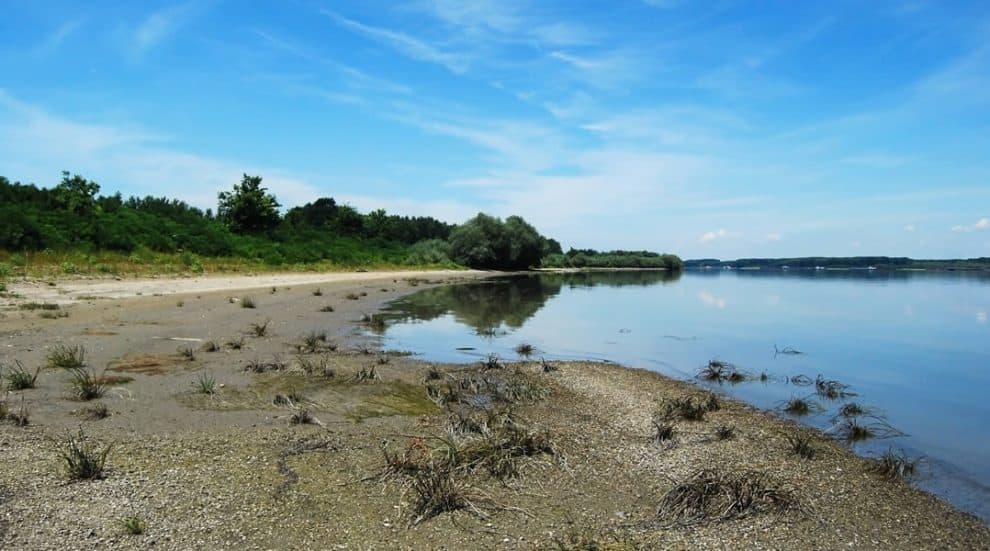I spent the Fourth of July weekend on Topsail Island, North Carolina, a coastal barrier island just south of the Outer Banks. At the southern end of the 26-mile island, in an area known as South Topsail Beach, an interesting occurrence has been happening over the past several years. This undeveloped southern tip of the island has been accreting land and extending southwest into the adjacent inlet at a rapid rate.
In the last decade or so, this southern tip has grown at the rate of approximately 100 feet per year. In the last twenty years, approximately 200-300 acres of new land has been added to the south end of the island through the accretion process. This trend is similar to the history of the island. Since 1738, the adjacent inlet has migrated southwest approximately six miles.
The visit over the holiday weekend made me think of accretion, reliction, and avulsion, which are three terms in water law that address the movement of water and land. All three of these terms are complex, but they are important concepts for any landowner with property adjoining water. Accretion, reliction, and avulsion can affect all types of land, including ranches, farms, and residential properties.
Since rivers, lakes, and coastlines frequently serve as property boundaries, it is important to understand what happens when that water shifts and moves, or when the adjacent land receives deposits or erodes. Fortunately for such landowners, laws addressing accretion, reliction, and avulsion have been established by the states and the federal government.
General working definitions of each concept are as follows:
- Reliction means an increase in the land area due to the gradual receding of a body of water, such as a lake or sea. Reliction also means a change in the boundaries of a property as a result of a shift in the course of a river or stream.
- Accretion means an increase in land area due to the permanent retreat of the high-water mark of a waterfront property. It also means an increase in property size as a result of the depositing of soil from a river, stream, or sea.
- Avulsion means a sudden severing of certain land from other property as a result of flood, currents, or a change in a water body’s course. A key component of avulsion is the suddenness of the change, relative to the gradual nature of accretion and reliction. Avulsion is thought of particularly in situations in which a river jumps its bank, separating a portion of one person’s property and joining it to an adjacent landowner’s.
Accretion, reliction, and avulsion each are complex topics, and different laws apply depending on the state and federal jurisdictions involved. In the United States, the applicable law can include a combination of state law and federal law.
Most of the governing law is based on historical English common law, with modifications having been made by state statutes, case law, and federal statutes. Individual states have different interpretations of these water law concepts. The federal government also has its own body of water law to address navigable and non-navigable waters, as well as tidal waters and the public’s access to commercial navigation.
Notwithstanding the complexity and location-specific nature of this area of water law, there are a few general rules of thumb:
- Where accretion or reliction occurs, such as a stream bank’s gradual erosion or growth by soil deposits, historical common law provides that these gradual changes result in changes to the boundaries of the adjoining properties. As the river gradually moves its course, the adjoining boundaries will move to follow the new course.
- When avulsion occurs, such as a very rapid shift of a stream’s course, the common law treats this differently than accretion and reliction. Avulsion does not necessarily alter a boundary. If a river channel suddenly jumps its banks and begins to run along a new route, the issue is whether the prior boundary still can be identified. If the prior boundary is able to be identified, then the prior boundary remains as the property boundary. If the prior boundary cannot be identified, then the new river course likely would be considered the new property boundary.
Accretion, reliction and avulsion are complex topics, and while this article only briefly touches on them, a landowner with property adjacent to a waterway should have a general working knowledge of this area of water law. The landowner may never have to invoke water law rights, but knowing how the law interprets rights in relation to land and water may be useful during the period of ownership.
This content may not be used or reproduced in any manner whatsoever, in part or in whole, without written permission of LANDTHINK. Use of this content without permission is a violation of federal copyright law. The articles, posts, comments, opinions and information provided by LANDTHINK are for informational and research purposes only and DOES NOT substitute or coincide with the advice of an attorney, accountant, real estate broker or any other licensed real estate professional. LANDTHINK strongly advises visitors and readers to seek their own professional guidance and advice related to buying, investing in or selling real estate.









Excellent article and something real estate agents probably have no idea about, but a most important part of Land brokerage. Funny you chose Topsail Island as you subject.
October 8th at at 9 AM I will be instruction our “Introduction to Land Brokerage”, the first ever 4 hour continuing education class in North Carolina dedicated to the subject of Land. The Topsail Island Association of Realtors is the sponsor and we welcome anyone to join us . There number is 919 1406.